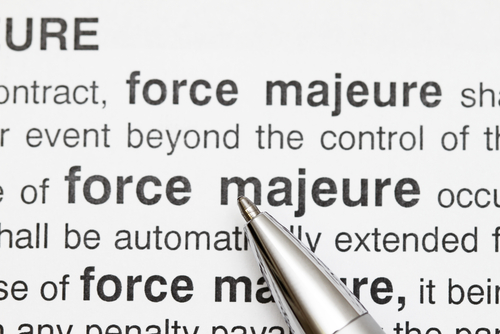When negotiating a business contract, smart companies try to include all possible defenses in the contractual language to excuse nonperformance through force majeure clauses. In situations such as the unexpected outbreak of the coronavirus (COVID-19), companies find themselves unable to do business as usual, produce as promised, or deliver on agreed upon deadlines. New York’s mandated shelter in place orders for non-essential workers and voluntary self-quarantine for essential workers showing symptoms of the virus or exposed to it have put businesses’ abilities to perform to the test. Due to this, businesses are examining whether they can excuse performance under force majeure either temporarily or permanently.
What is Force Majeure?
Force majeure is a provision included in a contract that excuses performance of obligations by either one or all parties if circumstances out of the parties’ control arise, making it impossible or impractical to perform on contractual obligations. It’s typical to see clauses enumerating force majeure events such as:
- Strikes or labor disputes,
- Acts of terror, wars, and epidemics,
- Acts of God including acts of nature like earthquakes and fires or weather events such as floods and hurricanes, and
- Government actions such as condemnation or law changes.
Generally, force majeure doesn’t include economic hardship, but the language of the specific contract at issue will decide if the clause may be invoked as an excuse for nonperformance.
New York Force Majeure Requirements
When it comes to impossibility or impracticability of performance due to coronavirus, New York has specific standards to evaluate. To invoke force majeure, the specific event must generally be listed in the contractual clause. There are a few possibilities invoke the clause.
Epidemics and Pandemics
The World Health Organization has labeled coronavirus a pandemic. If a pandemic is listed in the clause, the nonperforming party may claim force majeure applies. However, some clauses choose the phrase epidemic, so it would be up to the nonperforming party to argue coronavirus still falls under that definition and nonperformance is excused.
Government Action
If, however, neither pandemic nor epidemic were included in a force majeure clause, the nonperforming party may argue coronavirus is covered by the clause of “government action” in that the State of New York has mandated a lockdown to prevent further coronavirus cases.
Foreseeability
New York further requires that even if a force majeure event included in the contract took place, the event was unforeseen – an argument likely to succeed in the case of coronavirus’ sudden, explosive spread. Further, the nonperforming party has to try to perform their duties even after the event occurred.
New York Civil Litigation Lawyer
Creating a contract is an important event both for both a business and any other parties to the contract. It’s important to negotiate for as many protections as possible for your business, but it’s also important to fight for those protections when unforeseen circumstances make performing your obligations impossible. To have someone looking out for your best interests and fighting for your business in uncertain times, speak with the New York civil litigation lawyers at MOWK Law today. Contact us today with your questions—we are all working remotely and fully available to new and potential clients.

